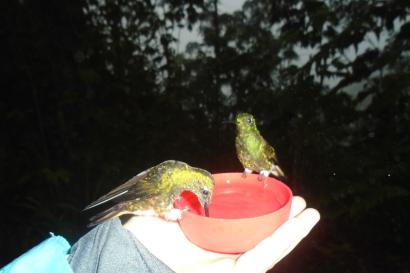Truthfully, I was equal parts excited and terrified for our arrival to the Galápagos. While Quito was a completely new experience for me, it still offered a pace of life that I was used to. You hold on for dear life on the buses for thirty-five cents a pop, you jay-walk in front of motorcycles, you explore a new neighborhood every day, you accidentally end up on a highway, blah blah blah. Very good, very fun, very familiar. But going from a visit to Coney Island once every few years at most to taking classes with the same thirty people every day and an ocean view? Despite growing up in one of the most densely populated cities in the world, I’m reminded often that Manhattan is still an island. The world feels small even in Brooklyn. What the hell does that mean on an island in the middle of the Pacific? Actually…not much.
We spend most of our time on San Cristóbal, the second-most populous island in the archipelago with about 6,000 residents, depending on who you ask. You see the same people all the time, but there’s enough space to do what you want without feeling claustrophobic. Students and researchers in other programs come and go, as do tourists (some you’ll love, like our adopted island grandfather Paul, or some you’ll hate like the two very drunk German girls who wouldn’t stop singing Bohemian Rapsody at La Regata's karaoke).
Unlike a normal semester, all tracks in this program operate module by module; after a week of Spanish class, every three weeks, you have a new class. Class is daily and lasts three hours long, plus field trips. The level of academic rigor varies from course to course, track to track, and even semester to semester. In terms of workload, I’ve had nights where I don’t feel like I’m in school at all, and I’ve had nights where I’ve had no idea how I’m going to finish everything I need to do before my next 9 A.M. class. One time I had a leaf due for homework (not a joke) and another time I had two full research papers due. Overall, though, the module system makes this much more doable than the academic overwhelm you might feel in a more traditional semester. You worry about one final at a time instead of all of them at once. This means that you’ll have plenty of time to work on your tan, test your free diving skills, and play Get Down Mr. President in the ocean.
Seeing the same 30 or so people every day for an entire semester offers unique challenges, but equally unique opportunities for friendship. When we read a 2020 paper titled "Promoting inclusion in ecological field experiences: Examining and overcoming barriers to a professional rite of passage", it all clicked. The paper defines the liminality experienced during undergraduate field research as a “transitional condition where conventional social structure is suspended and the participants are separated from their regular social ties and daily residence.” Unless you come from a conservatory or a similarly tight-knit academic space, this may not be comfortable at first. Or at all. There’s already something intrinsically transformative about upending your life to live somewhere new for a semester, so adding this layer of liminality on top of it just multiplies that transformation. If you know in advance that this isn’t the type of social setting you can bear, keep that in mind while applying. That said, I wouldn’t trade it for anything. I’ve made lifelong friends during my time here, and even with my classmates who I’m not as close to, we’ve bonded heavily over walking through spiderwebs and swimming through a pond in the middle of a hiking trail.
The fieldwork isn’t always easy. It’s frequently sweaty and muddy. You’re tired, sore, and itchy, and you’ll look forward to never having to wake up at 4 A.M. again. That’s just how it goes. Know that your limits may not be the same as everyone else’s, so be patient with yourself and the people around you. Whether you have years of field experience or none at all, this semester will challenge you regardless. But for me, those uncomfortable elements often make the trip. Delilah, Mikaela, Sarah, Karis, and I still laugh about how miserable we were at Jardín de Las Opuntias, but we also still talk about how incredible it was to catch and band Darwin’s finches the following day. You lose a lot of the comforts you’re used to out in the field, and this makes the successes feel even better, and makes your capacity for self-advocacy and kindness even more important. When you don’t feel comfortable speaking up for yourself, I’ve felt very supported by IES in my time here, and they offer a lot of support to make sure you can get what you need in this incredibly unique experience. I love life here. I think it’s perfect. There’s really no way for me to fully describe what it feels like—it’s something that will surprise you endlessly, and I hope, delight you even endlessly-er. I have to go identify native plants with my friends by midnight, so I’m gonna wrap things up here and leave you with: run towards discomfort! More life! More life! More life!

Anya Jiménez
Anya Jiménez is a Screenwriting major with a minor in Environmental Studies. She got scuba certified before learning how to drive, but as a New Yorker, she never thought she’d need a license. Anya was wrong and pays for this act of hubris daily.






